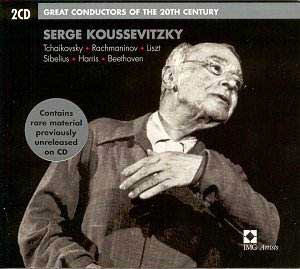 Composer: Serge Koussevitzky
Composer: Serge Koussevitzky
Works: Tchaikovsky: Symphony No. 5 in E minor, Op. 64; Rachmaninov: The Isle of the Dead, Op. 29; Liszt: Mephisto Waltz No. 1; Sibelius: Symphony No. 7 in C, Op. 105; Harris: Symphony No. 3; Beethoven: Symphony No. 5 in C minor, Op. 67
Performers: Boston Symphony Orchestra (1, 2, 3, 5); BBC Symphony Orchestra (4); London Philharmonic Orchestra (6)
Recording: Symphony Hall, Boston (1, 2, 3, 5); Queen’s Hall, London (4, recorded live); Abbey Road Studios, London (6)
Label: EMI
Serge Koussevitzky, a pivotal figure in the 20th-century conducting landscape, is often remembered for his ability to extract profound emotional depth from orchestral works, a quality vividly captured in this collection of performances. Spanning the breadth of the symphonic repertoire, from Tchaikovsky to Sibelius, this compilation not only showcases Koussevitzky’s interpretative prowess but also serves as a historical document of the sound and style of orchestral performance during his tenure with the Boston Symphony Orchestra.
Koussevitzky’s interpretation of Tchaikovsky’s Symphony No. 5 is striking, marked by a commanding presence and a keen sense of momentum. The opening clarinet melody is enveloped by sumptuous string chords, demonstrating Koussevitzky’s distinctive ability to colour the orchestral fabric with a rich tonal palette. His decision to maintain a brisk tempo in the Allegro con anima contrasts sharply with the more ponderous approaches of his contemporaries, creating an exhilarating sense of forward motion. This performance possesses a visceral energy; the climaxes are monumental, constructed with a meticulous buildup that leaves the listener in a state of eager anticipation. Koussevitzky’s use of rallentando before key moments is particularly effective, adding dramatic weight without compromising the overall tempo.
Rachmaninov’s The Isle of the Dead benefits from Koussevitzky’s mastery of dark orchestral timbres, with the Boston strings producing a hauntingly beautiful sound that resonates with the work’s brooding character. This interpretation stands as an exemplary comparison to Rachmaninov’s own recordings, revealing a depth of understanding that illuminates the score’s emotional landscape. Liszt’s Mephisto Waltz No. 1 is approached with a delicate touch, eschewing the more bombastic interpretations for a nuanced exploration of its phantasmagorical qualities. Koussevitzky’s careful pacing reveals intricate details within the orchestration that often get obscured in more hurried renditions, reaffirming his status as a conductor who valued clarity and precision.
The inclusion of Sibelius’s Symphony No. 7, recorded live with the BBC Symphony Orchestra, presents an electrifying listening experience. Koussevitzky’s interpretation captures the work’s evolving structure and inherent tension, a testament to his ability to engage with the music as an evolving narrative. The performance’s raw energy is palpable, even decades later, showcasing a connection between conductor and orchestra that transcends the mere execution of notes. The palpable tension in the final movement, coupled with Koussevitzky’s keen ear for orchestral balance, results in a performance that feels both immediate and timeless.
While the recording quality reflects its era, it nonetheless delivers a reasonably clear reproduction, allowing the listener to appreciate the orchestral textures. The slightly dated sound does not detract from Koussevitzky’s interpretive insights; rather, it enhances the historical context of these recordings. The engineering captures the rich sonorities of the Boston strings, lending an authenticity that modern audiences can still appreciate.
Despite some criticisms regarding the portamento in the playing of the British orchestras, particularly in the Beethoven Fifth, Koussevitzky’s reading remains a majestic interpretation. His adherence to the rhythmic integrity of the opening motif, coupled with a nuanced understanding of the scherzo, reaffirms the interpretive distinctiveness that characterizes his approach. The performance’s grandiosity is complemented by a clarity that allows the listener to discern intricate details within the orchestration, particularly in the transitions leading to the finale.
This collection serves as a compelling reminder of Koussevitzky’s profound impact on the orchestral repertoire and performance style. The emotional intensity he draws from his musicians is palpable, creating a legacy that continues to resonate today. By illuminating the complexities of each work with his interpretive acumen, Koussevitzky not only solidifies his place among the great conductors of the 20th century but also invites contemporary listeners to revisit these masterpieces with fresh ears. The recordings are not merely historical artifacts; they are vibrant explorations of the symphonic tradition, deserving of both critical attention and enthusiastic recommendation.



